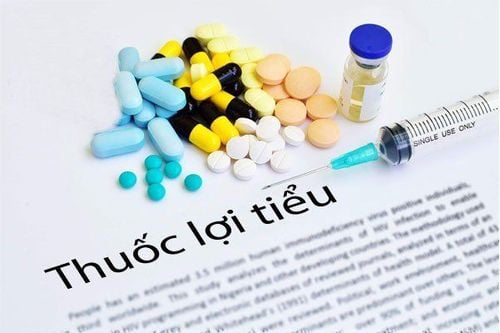This is an automatically translated article.
To check the magnesium level in the body, the doctor will recommend the patient to conduct a magnesium test. Magnesium biochemistry is very important because an excess or a deficiency of this mineral can affect the health of both adults and children.
1. Magnesium's role in the body
Magnesium is a mineral found both in the Earth's crust and in the human body. Magnesium is essential for the proper functioning of bones, heart, muscles and nerves. In addition, this mineral also helps the body control energy and blood sugar, regulate blood pressure as well as participate in many other processes.
Humans get magnesium from many food sources in nature, such as peanut butter, nuts and beans, spinach, whole grains, bananas, milk and salmon... Magnesium is also present in nutritional composition of some breakfast cereals, bottled water and other foods. The subjects at risk of having difficulty absorbing magnesium from daily food sources are:
People who drink too much alcohol; Patients with kidney problems, digestion or celiac disease (gluten intolerance); Are taking certain medications. 1.1. What happens to the body without magnesium? In people who do not absorb the necessary amount of minerals, magnesium deficiency in the long term will cause the following symptoms:
Poor appetite; Nausea and vomiting, sometimes accompanied by abdominal pain; Frequent drowsiness; Body fatigue, weakness; Severe cases can cause muscle spasms and uncontrollable shaking. Over time, magnesium deficiency can lead to weakened bones, headaches, frequent anxiety, and even damage to the heart organs. Low magnesium levels are more likely to lead to deficiencies in other important minerals, such as calcium and potassium.
1.2. What happens to the body if there is an excess of magnesium? Cases of too much magnesium in the body are less common than magnesium deficiency. Magnesium excess occurs in patients with kidney damage, or who are taking certain magnesium-containing antacids. Symptoms of magnesium excess are similar to those of magnesium deficiency, including:
Nausea; Muscle weakness; Loss of appetite ; Irregular heartbeat. This condition is sometimes a serious problem because there is a risk that the patient's heart will stop beating.

Buồn nôn có thể là một triệu chứng của thừa magie
2. Serum Magnesium Test
2.1. Indications A blood test is the most common way to find out magnesium levels in the body. Medical science often uses the term serum magnesium test to refer to this type of test. The doctor may order the patient to have a magnesium blood test if:
There are signs of magnesium deficiency or excess; Renal dysfunction; Uncontrolled diabetes; Detect chronic low Calcium and Potassium levels; In addition, serum magnesium test can also be ordered to evaluate the effect after the treatment period.
2.2. Procedure Similar to other blood tests, when checking for magnesium levels in the body, the medical staff will clean the patient's skin, then insert a needle into a vein in the arm or hand and perform the procedure. blood sample collection. This process will cause the patient to feel a slight stinging sensation and not cause much pain. After having enough blood to be tested (about 2ml), the nurse will take out the needle and put a bandage on the skin that still has some blood.
Note that blood samples are usually taken in the morning, the magnesium test takes about 1 hour and the patient does not need to prepare anything special.
2.3. Results Test results for magnesium deficiency or excess are usually available within a few days at the latest. Low magnesium levels in the body mean that the patient is not absorbing enough nutrients from the daily diet and needs to pay extra attention. Low magnesium levels in the body often appear in people with a recent history of surgery. In addition, this result also reflects signs of:
Diabetes; Have thyroid problems ; Abnormalities in pregnancy; Other health conditions. Conversely, if the body accumulates more magnesium than necessary, the patient needs to limit and eliminate them. An increase in the concentration of magnesium in the blood, usually due to decreased excretion or excessive supplementation, occurs in patients with:
Renal failure ; Hyperparathyroidism, hypothyroidism; Dehydration; Diabetic acidosis; Addison's disease (primary adrenal insufficiency); Use magnesium-containing antacids or laxatives.

Mức Magie thấp có thể xuất hiện ở những người bị bệnh tiểu đường
3. Other Magnesium Tests
Some experts say that a blood test is not the best way to determine magnesium levels in the body. The reason is because the majority of magnesium is concentrated in bones (accounting for 50-70%) and other muscle or soft tissues, only about 1% is in the blood. Magnesium will leave the cells and enter the blood when a person feels stressed, stressed. Therefore, the magnesium deficiency or excess blood test will not reflect the exact concentration and the true reading may be higher than the serum magnesium test result alone.
Other forms of magnesium testing include:
Determination of the level of magnesium excreted in the urine ; Check magnesium levels in red blood cells (RBC); Magnesium testing through an oral sample (however, this is not common because it is difficult to perform and very expensive); Inject additional magnesium into the blood, then determine the dose excreted in the urine. In general, the doctor is responsible for explaining to the patient about the indicators in the results, as well as ordering other magnesium tests if necessary.
4. Reference value
The normal serum magnesium level reference value is from 0.7 to 1.1 mmol/L, the mean values fluctuate according to age and sex as follows:
| Đối tượng | Đơn vị mg/dL | Đơn vị mmol/L |
|---|---|---|
| Trẻ sơ sinh (tuần đầu tiên) | 1,2 - 2,6 | 0,48 - 1,05 |
| Trẻ em (tuổi đi học) | 1,5 - 2,3 | 0,60 - 0,95 |
| Nam trưởng thành | 1,8 - 2,6 | 0,73 - 1,06 |
| Nữ trưởng thành | 1,9 - 2,5 | 0,77 - 1,03 |
Urine Mg/24h level in healthy people is:
| Trung bình | 73 - 122 mg/24h | 3 - 5 mmol/ 24h |
|---|---|---|
| Thiếu hụt Magie | < 12 mg/ 24h | < 0,5 mmol/24h |
| Giảm Magie máu do thận | > 24 mg/ 24h | > 1 mmol/24h |
Note: How to convert unit: mg/dL × 0.4113 = mmol/L
In short, Magnesium is a mineral that is essential for energy production, muscle contraction, and function maintenance. nervous system and helps keep bones strong. Magnesium biochemistry tests are often ordered to check for magnesium deficiency in people with malabsorption, malnutrition, diarrhea, alcoholism, or taking drugs that increase the renal excretion of magnesium. Magnesium levels in the body will be excess if excretion is reduced or due to excessive supplementation, whereas magnesium deficiency is due to poor appetite and absorption or increased excretion.
Please dial HOTLINE for more information or register for an appointment HERE. Download MyVinmec app to make appointments faster and to manage your bookings easily.
Reference source: webmd.com












